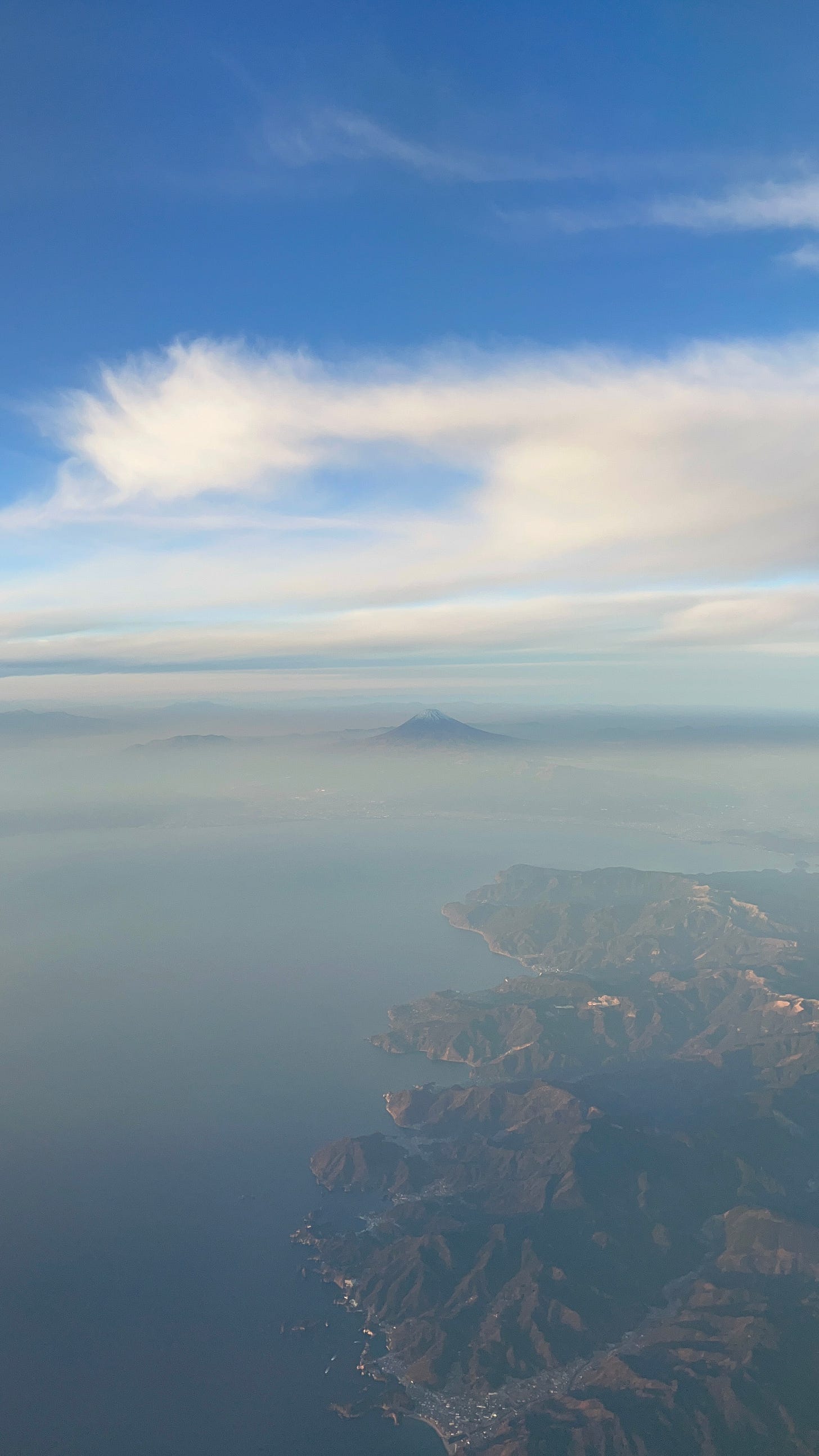Romanticizing Kodawari
What I learned from a 3 Michelin Star neighbourhood chef in Tokyo
Hello intersectional thinkers 👋
Happy New Year from somewhere above Mount Fuji 🗻
The travellers seated behind me were gawking at how "*everything* looks so beautiful in Japan!"
And that triggered something in me…
Coming up:
my (small) rant about Japan
the business model of authenticity and kodawari
Frickin Japan
I've lived in Japan on and off for more than a decade now (I stopped counting after year 5... everything starts to blur after that).
And since then, I've developed this peculiar crack in my personality:
I get riled up every time someone tells me how much they love Japan.
"OMG I love how the omakase is so a delicate art. Such depth to it. And the wagyu. HM! Just melts in your mouth. The perfect balance of sweetness and umami."
"Oh everyone is so nice and polite here. The service here is AMAZING!"
"Have you heard of wabisabi? It's this Japanese concept that I absolutely adore.... and kuchisabishi? It means you want to eat something because your mouth is lonely. Isn't that so poetic?!"
I know it's in vogue to love Japan. And Japan is objectively pretty specially.
But!
This cliché fascination infuriates me because:
no one cares to see the sacrifices the society has to make in order to have this abnormal normality
the wabisabi life they envision is out of context and honestly not so poetic IRL
And most importantly, I was also one of these doe eyed naïve Japanophiles.
And I wish I could unlearn what I know and go back to enjoying the mind-bending life this country has to offer.
So after one too many of these "OMG Japan is AWESOME" conversations, I decided, if others are romanticizing Japan wrong, I might as well do it right.
So let me tell you about Kanda.
Romanticizing kodawari
There's an unassuming restaurant called Kanda in my quiet Tokyo neighbourhood. It's the only 3 Michelin star Japanese restaurant that holds the coveted title for 15+ years.
The Chef, Kanda Hiroyuki, is a calm and collected guy from a seaside town in Tokushima.
He loves kendo, Hong Kong movies featuring Andy Lau, and wasn't so into cooking when he was young. Of course, you already know that doesn't stop life from turning Kanda into a legendary Michelin Star-studded chef.
His restaurant Kanda only seats 18.
No more, no less.
As you can imagine, it's nearly impossible to get in.
So last year, he finally moved his restaurant.
You'd think he'd opt for a bigger place. But in the new building, with all the flexibility to add more seats, Kanda still seats 18.
Why?!
Because the number of seats is his kodawari.
Kodawari is one of those Japanese words that doesn't quite translate.
It means to be particular about something. To pay too much attention to something that's irrelevant. To get stuck on something small.
The Japanese definition uses the kanji characters「拘泥」which literally means “picking mud apart”. So you get the idea... the telltale signs of a overly obsessive perfectionist.
Now if you're deep into your Japanophile journey, you might be one step ahead.
"I see where you're going with this. You're going to flip this debilitating perfectionist attitude with a relentless pursuit of perfection. It's about passion, commitment, the shokunin attention to detail."
And to that I say, aha - well played.
But the spirit of kodawari is not about a romanticized passionate pursuit of perfection.
Quite the opposite, kodawari is deeply rooted in a methodic, calm and atarimae matter of fact approach to life.
It is what it is
Kanda seats 18 because the most delicious fish size is only big enough to serve 18 people.
The size of the fish determines how many seats Kanda has.
Chef Kanda emphasizes this because his father is a fisherman.
Kanda Senior taught Chef Kanda to look for size when selecting fish.
It's that simple.
The restaurant can't seat more or less than 18 because it just doesn't make sense otherwise.
Maybe my fellow skeptics are thinking, “Then why not 36 seats? Why not a chain of 18 seat Kandas? Obviously this is just a tactic to create superficial scarcity.”
But the choice not to do so is the beauty of kodawari.
Because Kodawari is effortless sacrifice.
When you know something simply has to be done this way. Despite people telling you it doesn’t make common sense.
And when you effortlessly sacrifice, beauty follows. Perfection follows. Money follows.
Going against common sense is unique scarcity.
And when you are uniquely scarce, you'll be rewarded for your authenticity.
Everyone talks about being authentic. An easy gage for that authenticity is kodawari, what are you effortlessly sacrificing to stay true?
Have a good week :)
Vicky



This is a very intriguing concept and anecdote Vicky. I resonate with the kodawari concept, the uniqueness of doing things in a particular way, and how that authenticity leads to success. But I need help with the "effortless" part of the equation. What makes a sacrifice effortless? The word sacrifice in and of itself implies giving up something that matters in order to obtain something that matters more, so where does the effortlessness come in? In the absence of making a stretch, there's no longer a sacrifice occurring. This has me very curious and I'd love to understand it more thoroughly. Eric Ho would love this conversation since he's always talking about effortless leadership, and I'm also asking him for similar clarification. As someone who is always making things harder than they need to be to justify my existence I really want to apprentice to effortlessness, but I need help.
A valuable addition to my day! I have been feeling it, being a perfectionist myself, but I knew there was something more to the way I operate. And there it is. Kodawari. Thank you Vicky for sharing this! 🙏✨️